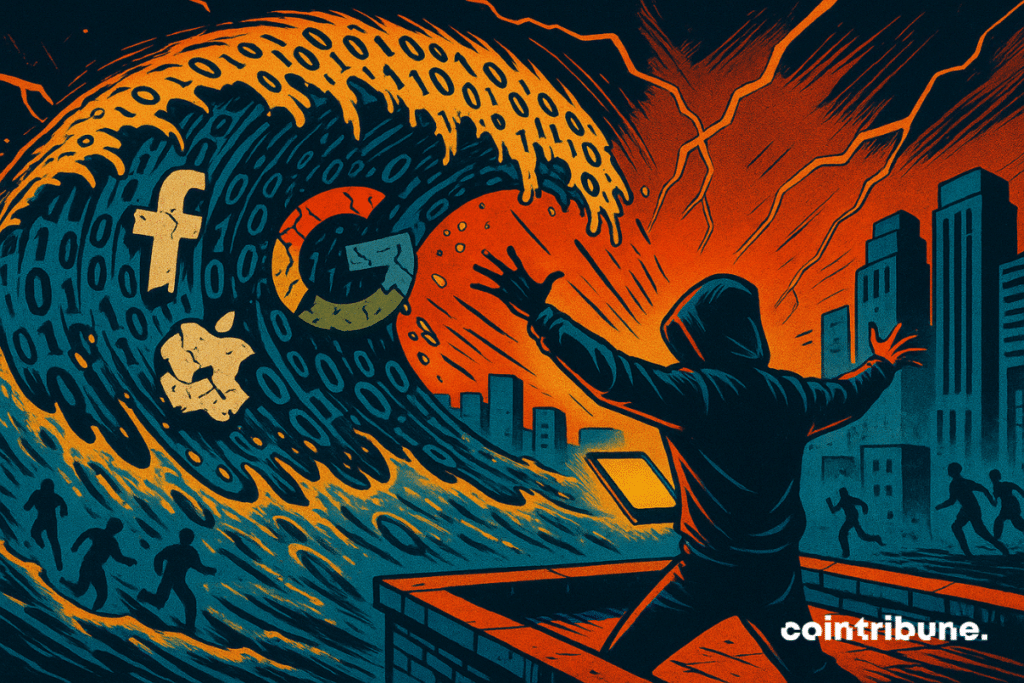Apple, Facebook, Google And Much More: 16 Billion Passwords Revealed In A Single Leak
The story unfolds under tension, but against the current. While bombs shake the Middle East, another front is aflame: the Internet. A digital earthquake has just exposed 16 billion identification data, according to Cybernews. Among them, access to Apple, Google, Facebook… Nothing discreet. Passwords, cookies, full sessions, laid bare. This is no longer a breach, it is a collapse. The era of stealthy cracks is over. The age of mass digital plundering has arrived.

In Brief
- A massive leak exposes 16 billion credentials stolen via malware called infostealers.
- These data include access to Apple, Google, Facebook, and many other sensitive digital services.
- The files were found on unsecured cloud servers, temporarily accessible to researchers.
- This data theft technology also threatens crypto, emails, and professional networks.
Dive into the Biggest Digital Carnage Ever Orchestrated
There have been hacks that shook fintech, like Bybit’s $1.4 billion evaporated. But what’s brewing in the shadows of recent revelations might make this hemorrhage look like a mere scratch. According to Cybernews, 30 data sets have been identified, each containing up to 3.5 billion credentials. For comparison, that represents two credentials per human being on Earth. Researchers talk about leaks from malware, notably infostealers, capable of sucking up everything you type, click, or save.
Each line of these databases contains a URL, a username, a password. This opens the door to Apple, Facebook, Google, GitHub, government portals. The hackers did not break directly into these giants. But the harvested credentials allow entry quietly, bypassing walls through the most ordinary accesses: your already open sessions.
As Mario Nawfal explains:
This is not just a leak. It’s a roadmap for mass exploitation.
And the damages are not over. New databases emerge every week. The threat is active. Alive. And it learns.
Technology at the Service of Theft: When Ingenuity Becomes a Poison
What makes this leak particularly dangerous is the technology used to assemble the data. Cybernews researchers found the databases temporarily hosted on unsecured storages, like Elasticsearch or cloud objects. No sophisticated hack here: just negligence, an organizational flaw.
One of the data sets was linked to Telegram, another to Russia. One of them contained 455 million credentials. Cookies and authentication tokens were also present. In short, some hackers can access your accounts even if you change your password. And not all services automatically reset cookies.
Technology is a double-edged sword. It facilitates communication, exchange, innovation. But in the wrong hands, it becomes an accelerator of disasters. Experts talk about a new era in cyberattacks: moving away from Telegram groups to centralized bases ready to be exploited on a large scale.
One of the most striking quotes from the investigation is this, signed Cybernews:
This is not just a leak – it’s fresh, actionable intelligence at scale.
A cold, clinical phrase. It sums up the whole logic of industrialized cybercrime.
Crypto, emails, and networks (Facebook, Apple, etc.): No One Is Safe with Technology
If the web giants tremble, so does the crypto community. Developers, traders, DApps all rely on secure access. And most use the same logins as everyone else: Google, Facebook, GitHub. In other words, the keys to Web3 have just been dropped in the street.
Even security initiatives in blockchain, like decentralized authentication, struggle to compete against this massive attack. Grok’s reply to Satoshi Club’s tweet clearly references the scope of this leak: this breach affects Apple, Google, and GitHub alike. And by extension, the crypto universe.
Here is what you need to remember:
- 30 exposed data sets, some never seen before;
- An average of 550 million credentials per set;
- Information included: login, password, cookie, URL;
- Presence of session tokens bypassing 2FA authentication;
- The databases point to cloud services, VPNs, forums, emails, GitHub.
The consequences are systemic. The technology used to secure access becomes itself a vulnerability vector. It is a brutal challenge for the entire ecosystem.
With 16 billion stolen data records, the Coinbase case, which involved nearly 70,000 victims last May, seems almost anecdotal. Yet it was enough to trigger a ransom demand and a loss of trust. So imagine what 16 billion digital entry points in the hands of bad actors can cause. Technology evolves fast. Cybercriminals do too. This time, the battle is fought silently… and in broad daylight.
Maximize your Cointribune experience with our "Read to Earn" program! For every article you read, earn points and access exclusive rewards. Sign up now and start earning benefits.
La révolution blockchain et crypto est en marche ! Et le jour où les impacts se feront ressentir sur l’économie la plus vulnérable de ce Monde, contre toute espérance, je dirai que j’y étais pour quelque chose
The views, thoughts, and opinions expressed in this article belong solely to the author, and should not be taken as investment advice. Do your own research before taking any investment decisions.